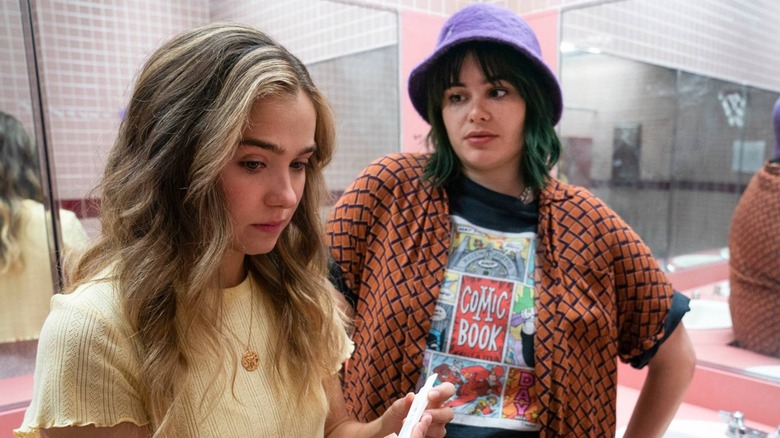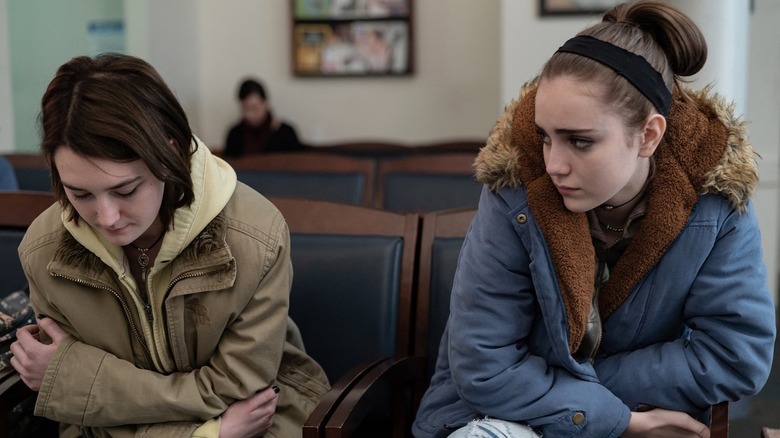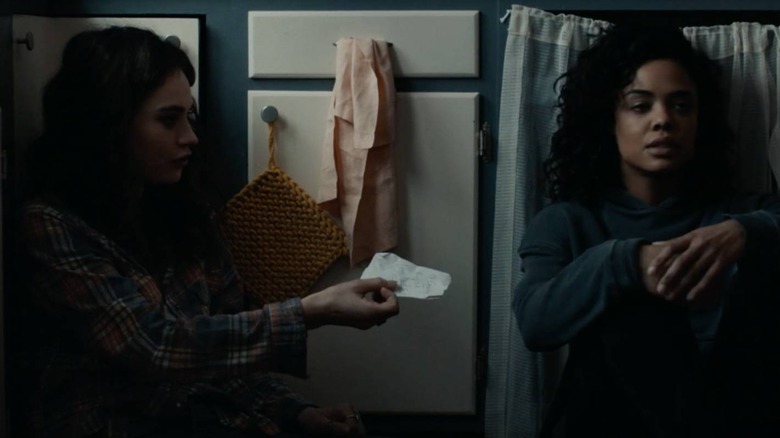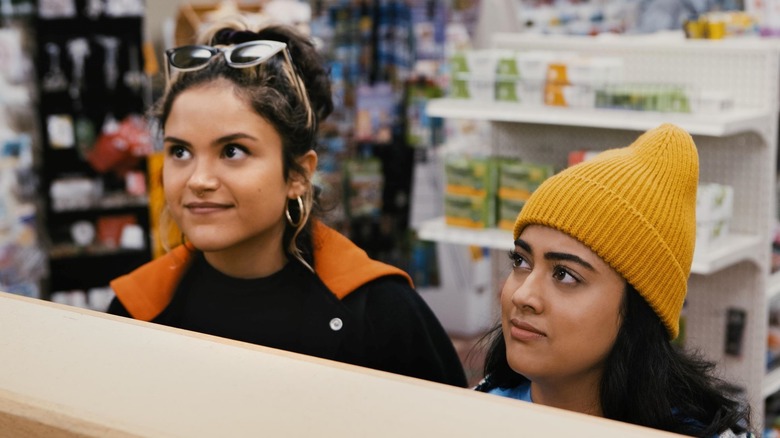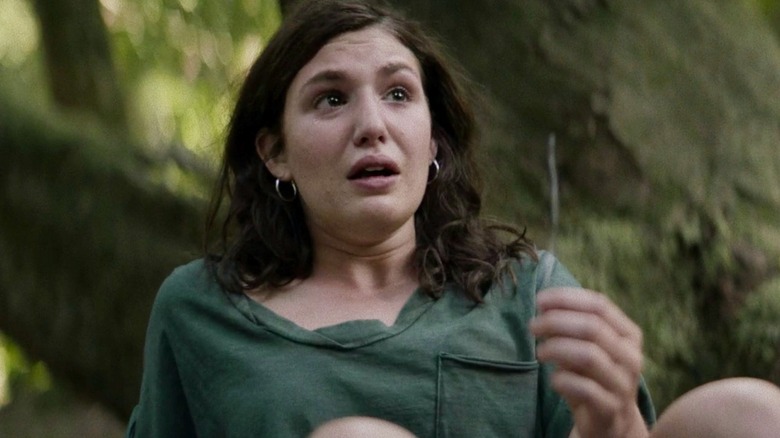The Growing Cinematic Trend Of The Abortion Road Trip Movie Is Our Bleak Reality
Fifteen years ago, Jason Reitman and Diablo Cody's Academy Award-winning teen pregnancy comedy "Juno" told the story of a pregnant teen who at first walks right into her local abortion clinic, only having to deal with a sole protestor and an odd receptionist who is way too comfortable talking about the smell of her boyfriend's junk. Juno eventually decides against having an abortion, instead choosing to pursue the route of adoption. Emphasis on the word "choosing." Two years later, the market was flooded with pregnant teen media, like MTV's "Teen Mom" and Lifetime movies like "The Pregnancy Pact." In recent years, stories about teen pregnancy have shifted dramatically to more accurately reflect the continued attacks from the United States government on reproductive rights.
In 2015, Paul Weitz introduced the "Abortion Road Trip Movie" to the mainstream with "Grandma" starring Lily Tomlin as a widowed lesbian who is asked by her granddaughter, Sage (Julia Garner) for assistance in paying for and seeking an abortion. Weitz was inspired by the lack of mainstream films that depict abortion, telling The Mary Sue, "There have been a lot of movies in the past which were unwilling to even use the word, despite millions of women having abortions ... so I just wanted it to be real." The film "Knocked Up" even made an entire bit about saying "shmashmortion" in place of the word.
The taboo nature of abortion in real life has bled into our media, which is probably why so many people end up learning from what they see on screen, and haven't fully grasped the severity of how mind-bogglingly difficult it has become to seek an abortion. The ease of entry shown in "Juno" no longer exists, and so the "Abortion Road Trip Movie" was born.
Abortion access is harder than ever
A 2017 study showed that millennials had less access to reproductive care than their parents' generation, as pregnancy and maternal health outcomes continued to get worse. Over 90% of all counties in the U.S. are without an abortion provider, and restrictive "heartbeat" bills have been passing like wildfire in several states. Comprehensive sex education is non-existent in most parts of the country and if the geographical limitations weren't enough, the financial barriers to abortion make it even harder (PLEASE seek out Abortion Funds, they're here to help). Lack of abortion access disproportionately impacts poor communities of color. On an episode of "The Daily Show," "Shout Your Abortion" co-founder and "Shrill" executive producer Lindy West rightfully stated, "Anti-choice people are not trying to stop abortion, they are trying to legislate who can and can't have abortions."
Writer, activist and Shout Your Abortion campaign co-founder Lindy West breaks down what’s at the core of anti-choice legislation and rhetoric: https://t.co/YqdVSXSMsO pic.twitter.com/ekMTwNY5nJ
— The Daily Show (@TheDailyShow) September 1, 2021
Yesterday, Politico reported that there had been a leak from the Supreme Court, revealing that they were planning on voting to overturn Roe v. Wade, the landmark case that legalized abortion. When Weitz debuted "Grandma" in 2015, the main conflict of the film centered on the fact that Grandma Ellie and granddaughter Sage were struggling to find the funds to pay for her abortion. As abortion legislation became more and more restrictive, the abortion road trip movies reflected the changing barriers.
Outlawing abortion doesn't make abortion go away
Before Nia DaCosta wowed audiences with her sequel to "Candyman" and nabbed the chance to direct "The Marvels," she made her feature directorial debut with the haunting crime thriller, "Little Woods." Set in North Dakota where there is only one abortion provider to service the entire state, "Little Woods" showcases the harrowing lengths people are willing to go through in order to obtain an abortion. "Emotionally authentic portrayals of sexual and reproductive health issues in film and on TV are more important now than ever because access to abortion is under constant attack from politicians," said Planned Parenthood Federation of America Director of Arts and Entertainment Engagement Caren Spruch. The film was hailed by abortion activists for its unflinching approach to the topic and saw the film as a success in destigmatizing people who choose abortion.
In 2020, Eliza Hittman delivered one of the best films of the year with "Never Rarely Sometimes Always." The film centered on 17-year-old Autumn Callahan (Sidney Flanigan) who discovers she's pregnant and is unable to have an abortion in her home state of Pennsylvania without parental consent. After attempting to miscarry by swallowing pills and self-harming, she finally tells her cousin Skylar (Talia Ryder), who robs the grocery store where she works in order to help Autumn reach New York City and have an abortion. The film was praised for its realistic portrayal of how difficult it can be to access safe abortions, and how unnecessarily cruel it is to force a teenager into this scenario.
Abortion isn't always a depressing nightmare
A few months after "Never Rarely Sometimes Always," HBO Max released the buddy-adventure road trip comedy, "Unpregnant." While tackling a similar story as the former, "Unpregnant" is a genuinely funny look at a trip gone wrong while trying to secure an abortion. Veronica (Haley Lu Richardson) enlists the help of her former best friend Bailey (Barbie Ferreira) to accompany her from Missouri to New Mexico, dealing with unexpected hijinks on the way. The topic is serious but is surrounded by warmth and hilarity, which is a necessity in a political landscape inundated with nothing but depression. Despite the popular framing, abortion isn't always a traumatic experience. "Unpregnant" introduced a new way to talk about abortion by adding levity, and genuine happiness.
In 2021, Hulu released Natalie Morales' "Plan B," about a young Indian girl (Kuhoo Verma) who is denied access to emergency contraception (AKA The Morning After Pill or Plan B) when a pharmacist refuses to sell it to her. If you think that sounds like something out of "The Handmaid's Tale," understand that these "conscience laws" implemented during the Trump administration are very real. In some states, the personal conscience of a pharmacist or health provider has more legal value than someone in need of reproductive medical intervention (Biden claims that he's going to roll these back). The plot of "Plan B" operates on a time crunch as emergency contraceptives are only effective when taken as soon as possible, so this pharmacist's denial puts Sunny and her best friend Lupe (Victoria Moroles) in a race against time. There's a good amount of humor scattered throughout, but the film stands alone in its centering of non-white protagonists. People of color face exponentially more barriers to reproductive health than their white counterparts, and "Plan B" isn't afraid to tackle those realities head-on.
These films are painfully real
Overturning Roe v. Wade will put the onus on state legislators to determine their own abortion laws, which will immediately make the United States an even more inequitable place than it already is. Road trips for abortions will become more common than they already are, but with warnings that states may try to criminalize traveling for an abortion, issues of extradition and access are going to get even more complicated. If the abortion road movie trend continues, the stories will be horrifying. Movies about seeking abortion are going to look like refugees seeking sanctuary from war, and the light-hearted nature of films like "Unpregnant" and "Plan B," which were steps in the right direction, will be idealistic pursuits cloaked in magical realism.
If we're being honest, we're not going to see nearly as many abortion road trips as we will at-home abortions more closely resembling "Yellowjackets," where teenagers attempt a DIY abortion in the woods. Coat hangers and bra wires will no longer be punchlines by hack comics, but rather last-ditch efforts to end pregnancies that will result in absolute tragedy.
I've tried my hardest to keep it together writing this piece, but the reality is that this article is nothing more than a Trojan Horse of "movie talk," filled with information about reproductive justice and a call to action. It has been next to impossible to care about anything other than the current state of things, as some of us do not have the privilege to ignore the news and instead focus our energy on MCU cameos and end-credit scenes. I wish I was the kind of person who could compartmentalize my fear and focus on something else, but I can't. Every waking thought is plagued by impending dread, and since my job is to write about movies, this is how I'm choosing to use my platform.
If you have the means, please consider donating to an abortion fund. We're going to need it.
